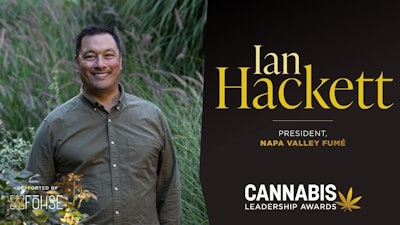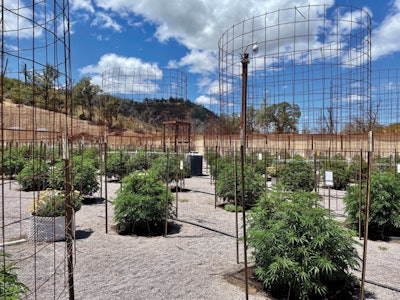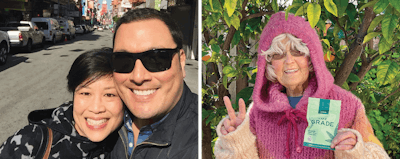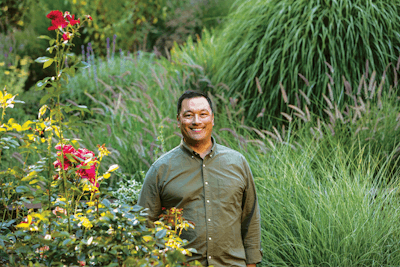

Growing up in San Francisco in the ’70s, Ian Hackett had a lot of freedom to make decisions —and make mistakes. He “gallivanted” around the city, he says, riding his bike, trying to keep up with his cousin who is four years older than him. But if he spent too much time playing outside and didn’t finish his chores or do his homework, there were ramifications.
Being grounded didn’t mean being confined to his home, fuming. It meant filing. His mom, Annette Hackett, who was the primary caregiver after she and his father divorced, would take him to work, where she was a medical transcriptionist in an office comprised of women, and as he sorted papers, he listened to their conversations.
“My mom is very strong and independent and raised me—not to take care of myself—but [said], ‘Look, I have to go to work. I need you to not burn the house down and not get into trouble while I’m at work,’” says Hackett, who now leads a team of nearly 30 people at Napa Valley Fumé, an outdoor cultivator and cannabis brand in Lake County, Calif. “She was a single mom, and she had to focus on her job and be able to afford what we had. So that kind of instilled responsibility in me in a way that I don’t think I ever felt burdened by it. I felt freedom in it because I was able to make my own decisions. … It also taught me accountability.”
Spending time at the office, he also observed how his mom and her seven coworkers interacted. Her colleagues were her friends and her family. When Annette’s mother passed away unexpectedly while on a trip to England, she had to leave quickly to take care of things, and Hackett was in school.
“When my grandmother on my mom’s side passed away, her friend Sharon stepped up and said, ‘You go. I’ll take care of Ian.’ So it was that type of community that I witnessed; it was a group of friends that took care of each other,” Hackett says. “My mom raised me, but all of these individuals informed me as a human.”
They also informed him as a leader.
“If everyone can see how they fit in and contribute, they are more likely to show up and collaborate.” Ian Hackett, President, Napa Valley Fumé
Inspiring Women
A framed photograph of Hackett sitting on his paternal grandmother’s lap when he was a baby is next to his desk; he describes her as “one of the sweetest, most soft-spoken people.”
“My grandmother was an amazing woman. She had six children in total, my dad is the eldest of the family, and my grandmother fought during the Chinese People’s War of Liberation,” Hackett says. “She was born in San Jose, met my grandfather, moved back to China, the war broke out—there’s an incredible picture of my grandmother with a rifle in her military uniform that I find inspiring given she had six kids and a husband at that time. She wanted a better life for her and her family, which ultimately led her to bring them back to the U.S.”
Hackett’s dad, a successful actor in China, made his way back to the U.S., and his mom, born in Liverpool, England, made her way to San Francisco via Cleveland. They met at a disco in the 1960s, Hackett says.
Even though his parents divorced when he was just 4 years old, Hackett maintained relationships with his family on both sides, including his sister Cindy Ng, one of the many women who inspired him and shaped him.
One of his mother’s two sisters lived across the street, so he spent much of his childhood running back and forth between homes. Tuesdays generally meant Annette was making liver and onions, which he was able to confirm from outside his home by opening the mail slot, so he’d run over to his Aunt Barbara’s place to see what was cooking there. His aunt had a strong imprint on his life, especially when observing her reactions in times of crisis.
She passed away in 2021, and Hackett says that at the memorial service, they reflected on her “it is what it is” attitude and nurturing spirit.
“There was no situation, however seemingly stressful it could be … she always approached it very calmly,’” Hackett says. “That demonstrated to me that there is a moment you can react to something. You can go to the fear place, [and] I can look at this mountain in front of me and kind of tremble in front of it because it’s too big to absorb or process. Or there’s a moment you can sit with it and say, ‘This is what is in front of me, and I can choose to address the pieces that I know I can address.’
“And I think I’ve taken some of that and applied it to how I work with my teams. I approach things in a very methodical way of, let’s assess, let’s see what resources we have, and then let’s proceed to our best interest to try and achieve our goal.”
His mom, who he talks to every day, also instilled that loving pragmatism in Hackett from an early age.
“There were conversations where it was like, ‘We’re not going to be able to get that newest bike. You’re going to have to get a second-hand bike, and we’re going to do it this way, but you’re going to be able to go on that bike trip with the school,” Hackett says, holding back tears. “I understood; I admired my mom, and looking back at where I am now, I’m in awe of how she did it. And I appreciate it so much.”
Those early years were when he also honed his strong work ethic. His household chores involved primarily caring for the menagerie of animals his mom took in when others could no longer care for them—whether it was cleaning cat litter or parakeet and or hamster cages. He also started picking up odd jobs when he was 11 years old, restocking soda fridges, pulling staples out of wooden floorboards of a law office and mopping a laundromat floor at night.

From the Ground Up
Pragmatism—and patience—are skills Hackett honed during one of his first tech jobs at the startup Gloss.com, a company backed by Estée Lauder that built ecommerce websites for various beauty brands more than two decades ago when selling products online was still novel.
That’s when Kate Greer met Hackett, and where they “forged their friendship,” she says.
“It became very clear that Ian Hackett was the only guy who … [could] deal with all the dysfunction where they mixed engineers and perfume sprayers,” says Greer, who writes for the Fumé brand blogs. “Ian had the patience of a saint and was able to figure out how to be a bridge between developers and people in the beauty industry. He’s got an incredible aesthetic sense, but he’s also one of those people who is able to go down into the nuts and bolts and figure out how things work so he can be that effective translator. He can figure out how to harmonize things that normally clash.”
Specializing in ecommerce and marketing, he worked his way up at national brands like Macy’s and TRX Training, at startups and in segments as varied as mobile apps, weddings, wine and fitness, serving in senior director and vice president of ecommerce roles and helping shape customer experience.
Changing jobs frequently is common in the tech space, both because of acquisitions and of a desire to keep up with the latest trends, Hackett says. But it suited him. “I like the build phase and the creative phase,” he says. And his career might have continued on that trajectory.

Hackett was driving in the third lane of a jam-packed California highway when he suddenly thought he was having a heart attack.
“I was just thinking I need to get my car off the road so I don’t hit anyone. I need to pull over,” Hackett says. “It turned out to be a panic attack.”
His doctor prescribed a couple different medications and encouraged him to see a therapist. He went to talk to someone, but he was wary of taking the recommended prescriptions. Then he heard about CBD, tried it, and started to feel some relief.
When California legalized adult-use sales, his cannabis interest moved from personal to professional. Hackett had spent much of his career in the early dot-com days helping build ecommerce websites before online shopping was commonplace, and he saw a lot of similarities in an emerging industry trying to get off the ground without a lot of guidance.
“It reminded me of the early days in ecommerce where we were stepping out into a new frontier, if you will, and it was somewhat of a challenge of like, how is this going to work? I recall thinking, people are going to buy toilet paper online and have it delivered? Who is going to listen to music online?” Hackett says, laughing.
But Hackett had worked in ecommerce long enough where there were few surprises, and everything felt formulaic. He was unfulfilled.
He consulted his partner of 23 years, Steve Kariker, who was wary about Hackett’s decision to join the cannabis industry at first. But he fully supported him in the transition. His mother had her concerns, too, but trusted Hackett had considered the move carefully.
“Whether it was for a fitness company, a wine company, a mobile app company, or a car device company, it all became repetitive. I had the same tools to play with and the same platforms to work through, and I am a person that needs creativity. I enjoy challenges and coming up with new and better ways to do things,” Hackett says. “So yes, let’s go into cannabis, where there’s no banking, there’s no access to Google—there’s no advertising allowed—you have all of these restrictions where you can’t show the product.”
He jumped at the opportunity to make a change, to follow a new path and work for a company producing cannabis, something that could make a difference.

‘Talent Whisperer’
At Napa Valley Fumé, cannabis plants grow up to 16 feet tall outdoors on an acre under the California sun.
“We give them the space to be their natural, glorious selves,” says Hackett, who was promoted to president of the company in December 2021. “What I also loved about coming to the company is we let these plants become who they are supposed to be, or who they want to be.”
That philosophy of fostering unencumbered growth mirrors Hackett’s leadership style.
Although Eric Sklar, CEO of Napa Valley Fumé, hired Hackett in the spring of 2019 as chief marketing officer and head of compliance to help the company develop and launch its cannabis brands into dispensaries, his role continued to evolve, and he noticed how the team responded to him.
“[He has] a combination of incredible aesthetic design sense, creativity, combined with a real attention to detail not just on the design of a product but on the supply chain from seed to sale,” Sklar says. “We hired him for that, but after he was here, it was clear he had an incredible ability to manage people and to motivate them and to get them excited about our vision.”
Hackett jumped into multiple roles at the company, whether it was working with the team to properly tag and document plants in Metrc after harvest or investigating and implementing a more comprehensive healthcare plan for employees. Though his primary goal was to launch the LAKE GRADE and Fumé brands and oversee compliance, he took on more.
“He kind of dives in and learns everything possible he can and takes whatever experience from each organization and brings it forward,” Greer says. “He’s built his knowledge, and it’s very broad based. He’s self-taught and learns in any environment he finds himself in. He’s always looking at how to optimize things and makes them better than he finds them.”
He also was behind the launch of an internal company newsletter to highlight individual people on the team and help people connect, whether they work on the farm or the distribution center, which are in separate towns, or are on the road or work remotely.
“One of the intents was to bring awareness to what’s happening across the company, so our head of HR, Sarah Collins, she championed the idea, and she has been publishing a monthly newsletter where she talks about the team’s various accomplishments, introduces new team members, showcases an employee or two to give folks insights into their personalities and what they are like outside of the office,” Hackett says. “I wanted everyone that works here to know and feel that the work they do matters and is contributing to the company’s goals and mission. I wanted to do that in a very visual way, to show someone who is labeling a box, they might not feel they are contributing to our sales goals, but they are, and I wanted them to see how they fit in. If everyone can see how they fit in and contribute, they are more likely to show up and collaborate.”

Celebrating successes as a team is also essential, Hackett says, and the company recognizes birthdays with a card, cake and gift card. On 4/20 this year, Napa Valley Fumé arranged gift baskets for the team, and everyone gathered at “14:20” (2:20 p.m.). Hackett refers to these opportunities as “moments.”
“We had donuts, we had coffee … and then we sent everyone home early. We wanted them to have time to get home and celebrate 4/20, safely,” Hackett says. “We have these moments where we bring everyone together and we remind each other that we’re human, we’re doing our best, we’re a community, we’re a team, and we should go out and celebrate our space. It’s just a moment for us as a team to recognize and appreciate what we’re doing.”
Another key moment they celebrated was when one of their cultivars tested at 37% THC, he says, the highest percentage in the company’s history. Hackett wanted everyone in every department to know how they contributed, from trimming to packaging to security.
“He’s the keeper of the culture now,” Sklar says. “Every day, being in touch and knowing what’s going on with the team and those individuals—that’s what management is about. It’s about knowing each individual and what their needs are and hopes and fears are.”
Together, Hackett and Sklar created a North Star, an acronym employees can turn to that explains the core values of the company: Passionate, Leadership, Admirable, Never Satisfied, Transparency, or PLANT.
Hackett also helped focus the company’s philanthropic efforts, establishing a partnership with One Tree Planted to plant a tree for each eighth of LAKE GRADE product sold. And supporting social justice initiatives is a priority for Hackett, as well, as the company worked with The Last Prisoner project to send letters to people incarcerated for cannabis-related crimes during the holiday season and makes regular financial contributions. In addition, Sklar says Hackett serves as a role model for and has been a champion of LGBTQ+ initiatives. Greer added that Hackett seeks out partner companies owned by individuals who have not traditionally had access to cannabis ownership roles.
Sklar called his mentorship and relationships with employees at the company “the most important thing that he does,” and shared multiple examples of how Hackett helped others develop leadership roles within Napa Valley Fumé, such as Sarah Collins, who first worked as a driver before the company sold its delivery business.
Hackett says Collins, who is now the HR manager, was “high-fives and smiles” when he first met her. As he continued to work with her, he noticed she had that perfect blend of organizational skill, assertiveness and altruism necessary in human resources. Hackett arranged HR training and hired a consultant who meets with Collins twice a month to review aspects of the job, OSHA training, and to ensure that the company is following California standards, to help her “cultivate those other skills around her natural instincts and her natural tendency toward organization and project management,” Hackett says.
“I’ve watched him over the years coach and mentor so many different people from so many walks of life, and he really believes there’s gold inside of every person. It’s really our opportunity as leaders and mentors and managers to invite it out and then nurture it,” Greer says. “He’s a talent whisperer.”
Difficult conversations with employees are also a requirement of Hackett’s role. Although loving your job is not necessarily a requirement, liking the company and finding the role rewarding is, Hackett says. Napa Valley Fumé conducts regular employee satisfaction surveys and has 360 reviews.
Hackett’s mom is 87 years old, and after his aunt passed, it brought to the forefront the importance of living in the moment and spending your time wisely.
“We have these moments where we bring everyone together and we remind each other that we’re human, we’re doing our best, we’re a community, we’re a team, and we should go out and celebrate our space.” Ian Hackett, President, Napa Valley Fumé
“I want people who are here because they want to be here. They don’t necessarily have to say, ‘Oh, this is the best company to work for,’ but what they have to say is, ‘I like my company, my job, and I [feel rewarded],’” Hackett says. “They should be doing what truly makes them happy. We do this nine-to-five or 12-to-12, and we should do something that truly fulfills us.”
Many likely are, as Napa Valley Fumé was named a 2021 Best Cannabis Company To Work For—Cultivation, scoring highest in employee satisfaction surveys.
Jay Brooks, who Hackett hired as a marketing manager in 2020, recently decided to leave the company. Brooks liked his role but had an opportunity to pursue his “dream job.”
“It was probably one of the hardest conversations I’ve had in a very, very long time. When you really enjoy working for someone, and they’ve helped develop and grow you, and you’ve created a lasting relationship, not just on a professional level, but on a personal level, I felt like I was letting the team down, quite frankly,” says Brooks, who had been promoted to director of sales and marketing. Although Hackett was disappointed, Brooks says he encouraged him to “follow your passions and your dreams. You should go do that.”
“He’s definitely a visionary,” Brooks says. “He [helps] support the development and growth of people. He’d ask me where do you want to go? What do you want to do? And that led to building out the sales team and building out our sales program and being an open voice for that.”
Brooks sensed this from the moment he met Hackett for the initial job interview.
“It’s hard to put it into words, but when you talk to someone who emulates charisma, passion, always looking out for others and just forward thinking and a visionary but also cares about the people that he works with, you could just feel that from a phone call and the way he asks questions and holds space for listening, it was just how he showed up.”
“Showing up” was a repeated mantra during conversations with Hackett’s friends and colleagues, something he also noted when talking about his leadership philosophy.
“It all comes back to my mom and the values she instilled in me, and my aunts and how they showed up. And I watched them show up and the village of my mom’s friends who kept me in check and showed me right from wrong.”
***
Hackett spent a recent vacation at home, paddleboarding down the Russian River, tending to his trellised tomato plants and playing with his beloved Portuguese water dogs Coal and Luc at the house he shares with his partner, Steve, in West Sonoma County. After living in San Francisco for decades, chasing opportunities, Hackett feels at home here, and at home in cannabis.
Much of Hackett’s vacation was dedicated to establishing a backyard pond, hovering over the water, monitoring his new mosquitofish closely to make sure they were adapting well to their new environment. He didn’t start with koi, but instead opted for something more durable.
“They are the most sustainable, little hardy fish we can find. They look like miniature goldfish,” Hackett says. “And I didn’t want to put a koi in there—I don’t know if I’ll be able to help it survive, so I found a hardy little soldier who can get in there, and if it works out, maybe I’ll graduate to a koi one day. But I like to take a pragmatic approach to things. I don’t want to put something sensitive and delicate in a place that I don’t know if I can foster it.”
Michelle Simakis is editor-in-chief for Cannabis Business Times.






















